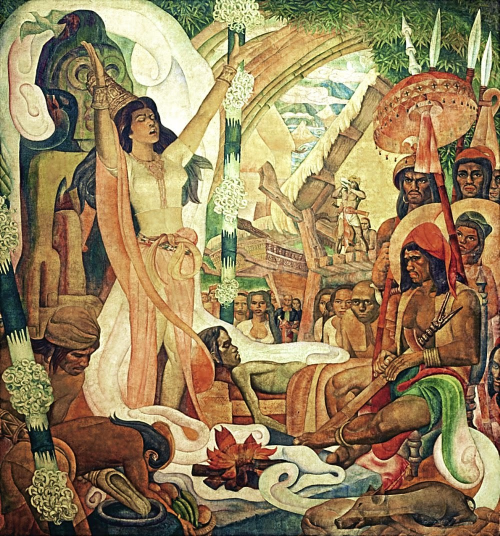Babaylan, ang manggagamot. Detail of Mural “History of Philippine Medicine” by Carlos “Botong” Francisco. Image credit: XiaoChua.net
A recent trip to Manila and Cebu left me wondering what the contemporary feminist movement looks like in the Philippines. My research unexpectedly led me to learn about a deep-seated tradition of women's leadership in the Philippines.
It was interesting to learn that the community structure of pre-Hispanic Philippine society could neither be described as a patriarchy nor a matriarchy. Before the Spanish colonized the Philippines, there existed a 500-year long tradition of indigenous feminism that predated women’s liberation in the West.
Babaylan refers to the pre-colonial Philippine tradition of female mystical healers whose spiritual connectedness was a source of political and social power. Babaylan women serve as intermediaries between spiritual and material worlds in their communities. Their leadership roles are multi-fold: warrior, healer, priestess and sage.
Babaylans listen to the community and lead through a deep understanding of the inter-connectedness of all life forms. To this day, many babaylans remain politically active in advocacy, activism and working for justice in their communities, especially in matters of land dispute, displacement, state violence, increased militarization and the plundering of their land.
Today babaylans lead resistance movements against imperialist interests in their resource-rich land. Lumad communities of Mindanao such as the Matigsalom, take great care to appoint a babaylan who can competently lead their community through crisis and hardship. Community members count on babaylan leadership that will ensure both peace and active resistance during politically contentious periods. Babaylans in some Lumad communities even rely on female babaylans to prove themselves physically capable of wielding weapons in defense of their land.
I often feel cheated by reductive stereotypes that Filipina women are meek and mahinhin. It is flat-out disingenuous, especially when the reality is that we are surrounded by literally hundreds of real-life examples of bold and brilliant Filipina women leaders. And having now learned about babaylans and their unwavering resistance to colonialism and imperialism, I am humbled by a quiet understanding that we, powerful, tenacious Filipina women leaders have always existed.
Learn more about Babaylan Women here.

